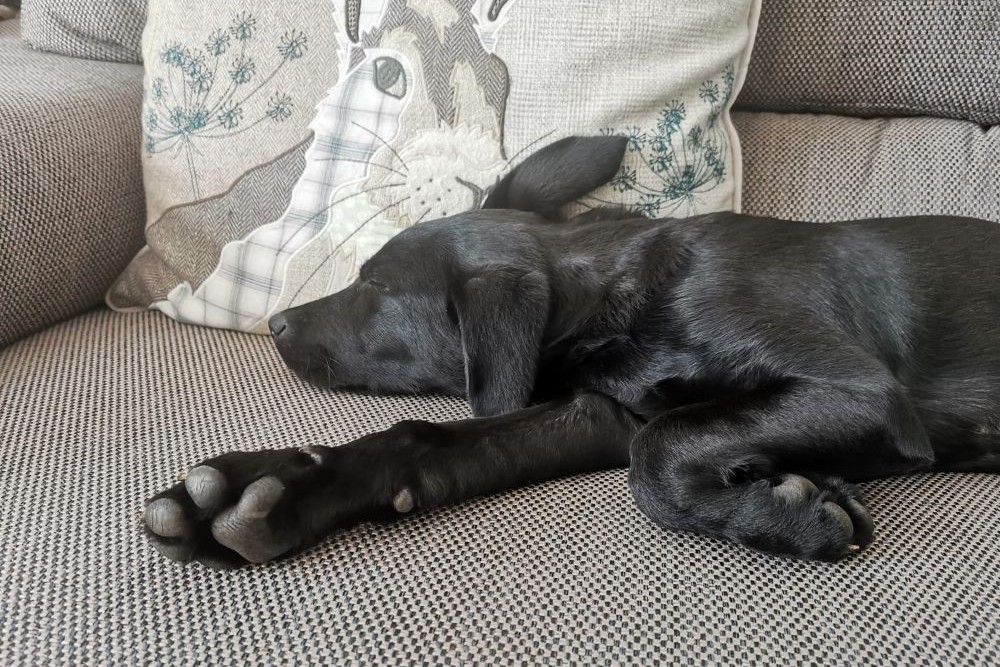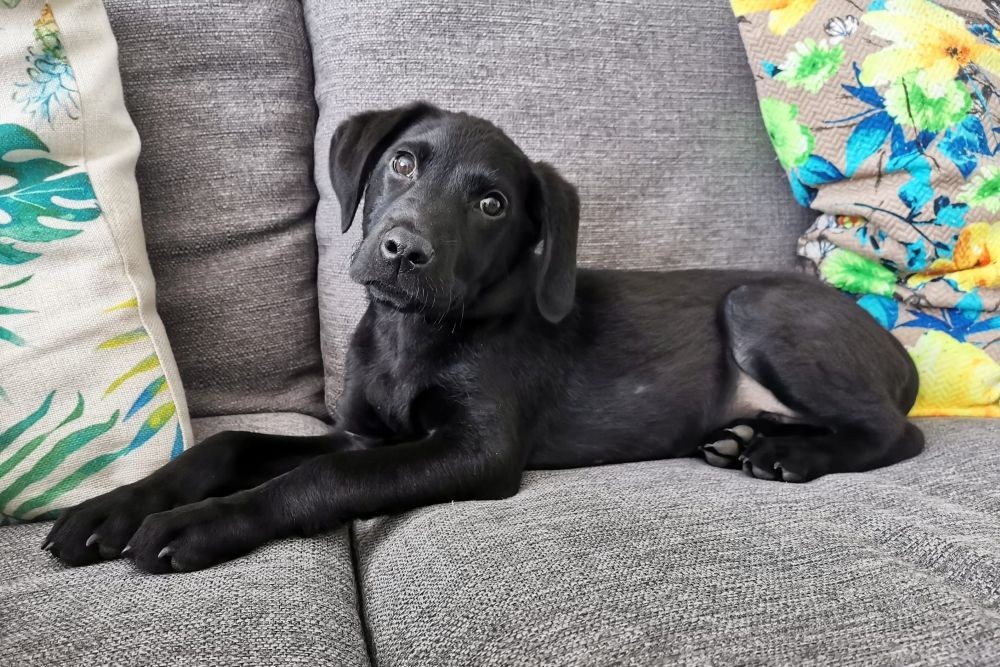Keep calm and carry on: New study from the RVC offers clues for how to ease puppy separation stress
New research from the Royal Veterinary College (RVC) has found that advising owners to behave calmly during their arrivals and departures helped puppies adjust to being left on their own. These findings provide valuable insights for veterinarians, trainers and puppy owners which can help prevent separation-related behaviour problems.

Separation-related behaviours (SRBs) are a common canine welfare problem and can include behaviours such as barking, whining, destruction or toileting when left alone. Often signs of stress, fear or frustration, in the most severe cases SRBs can lead to relinquishment or euthanasia. Despite SRBs being identified in approximately 50% of dogs, effective prevention strategies are poorly understood. This study, therefore set out to address this knowledge gap and provide a better understanding of the impact of preventative advice to owners on SRBs and puppy welfare.
Conducting this study, the RVC team, in collaboration with Dogs Trust, recruited 34 new puppy owners before they brought their dogs home. Owners were then randomly given one of four sets of guidance: general puppy care advice (the control advice), control plus calm departure and reunion advice, control plus gradual habituation to being left along advice, or a combination of all three sets of advice.
Tracking how puppies adapted to being left alone over time, the owners were asked to follow the advice and film their pets at four key stages during their first six months at home: the start of the first week, the end of the second week and then again at the three and six months of being in the home. At three months, owners and their puppies also took part in a supervised separation test. Each observation captured how the puppy behaved when left without human company.
After collating these insights, the researchers analysed the footage, scoring behaviours such as barking, whining, resting or playing to assess signs of anxiety or relaxation. Assessing the puppies’ responses, the research team gained an overview of how different advice strategies influenced SRBs.
While the study found no evidence that the advice had significant effects on specific signs of separation distress overall, it did reveal that puppies whose owners received calm departure and reunion guidance spent more time resting quietly when left alone – suggesting they were more relaxed. Similarly, puppies whose owners had been advised to gradually increase puppy time spent alone showed more resting, but only in the supervised separation test, and they also showed fewer passive signs of stress, such as panting or lip-licking.
It is possible that similar advice would also reduce SRBs, but that would require confirmation in a larger study with greater numbers of puppies than were observed in the current research. Nevertheless, the findings offer hope that advising new puppy owners to behave calmly around separation and to gradually help puppies become accustomed to being alone can help prevent the development of separation distress in puppies.
Key findings, include that:
- Compared with a control group, puppies rested more when alone if their owners had been advised to depart and return calmly, exercise puppies before leaving and to provide toys or treats to occupy them while alone.
- Puppies during a separation test also rested more if their owners had been advised to regularly and gradually train their puppies to tolerate being further away from their owners without the puppies ever becoming distressed, and to leave a long-lasting treat for their puppies when away.
- Puppies whose owners trained them in the above way and left long-lasting treats showed fewer passive signs of anxiety, such as lip-licking, looking at the door/entrance, and yawning, when left alone.
- Puppies left with another dog showed fewer of these passive signs of anxiety than those left without another dog.
- Puppies showed more passive signs of anxiety, and less positive behaviour (e.g. less eating and playing) if TVs or radios were left on while owners were away than if they were switched off.

Dr Fiona Dale, RVC PhD graduate and lead author of this paper, said:
“Getting a puppy is often an extremely exciting time for many people. However, working out how to successfully negotiate leaving puppies alone is an important consideration as puppies can become distressed leading to serious welfare problems which can also be very stressful for owners.
“On the other hand, some owners may be completely unaware that their dogs have a problem being left alone. When conducting the study, I reviewed one video where a puppy had been left for a few hours - it spent the entire time pacing back and forth, howling and whining and never settling. This was extremely upsetting to watch and was in stark contrast to what the owners had reported to me - they thought their puppy slept the whole time they were gone.
“While further research is recommended, we hope this exciting new study can give owners pointers on how to best prevent separation-related behaviours in their puppies. Taking a calm approach to leaving and returning to puppies and gradually getting puppies used to being left alone may be helpful in preventing SRBs from developing in the first place. So, in short, hopefully if we are calm, our puppies will be too!”
Dr Charlotte Burn, Associate Professor in Animal Welfare and Behaviour Science, and senior author of this paper, said:
“Separation related problems can develop from a young age while puppies are very dependent on caregivers, so helping young animals cope and stay calm while alone is important for preventing life-long issues.
“This study suggests that calm owner behaviour can help, which ties in with our previous findings that puppies were more likely to develop separation related behaviour if their owners fussed over them or punished them around departure and reunion. We’re really grateful to all the puppy owners who participated in this research to help future dogs and their owners cope better when they have to be apart.”
Dr Rachel Casey, Chief Operating Officer at Dogs Trust, said:
“Separation-related behaviours can be distressing and challenging, but this research shows that simple, practical guidance, such as calm departures and gradually building up the time they are left, may help puppies feel more secure when left alone.
“Sadly, Dogs Trust receives thousands of handover enquiries every year from owners struggling with elements of their dog's behaviour. Ensuring owners have access to clear, effective advice and techniques from the start of their dog’s life is key to preventing these issues from arising in the future.”
Notes to Editors
If any owner is concerned about their dog’s behaviour, they should contact their veterinary surgeon and/or an accredited animal behaviourist.
Dogs Trust also offers a free, behaviour support line for owners seeking advice or help with more details on their website at: https://www.dogstrust.org.uk/how-we-help/ownership/behaviour-support-line.
Reference
Dale, F. C., Casey, R. A., & Burn, C. C. (2026). Efficacy of advice for preventing separation-related behaviors in puppies: A video trial and separation test. Journal of Veterinary Behavior, 83, 52–68. doi: https://doi.org/10.1016/j.jveb.2025.11.002
The full paper can be accessed at: https://www.sciencedirect.com/science/article/pii/S1558787825001042?via%3Dihub
For media enquiries, please contact:
- rvc@plmr.co.uk
- Press Line: 0800 368 9520
About the RVC
- The Royal Veterinary College (RVC) is the UK's largest and longest established independent veterinary school and is a Member Institution of the University of London.
- It is one of the few veterinary schools in the world that hold accreditations from the RCVS in the UK (with associated recognition from the AVBC for Australasia, the VCI for Ireland and the SAVC for South Africa), the EAEVE in the EU, and AVMA in the USA and Canada.
- The RVC is ranked as the top veterinary school in the world in the QS World University Rankings by subject, 2025.
- The RVC offers undergraduate and postgraduate programmes in veterinary medicine, veterinary nursing and biological sciences.
- The RVC is a research-led institution, with 88% of its research rated as internationally excellent or world class in the Research Excellence Framework 2021.
- The RVC provides animal owners and the veterinary profession with access to expert veterinary care and advice through its teaching hospitals and first opinion practices in London and Hertfordshire.
